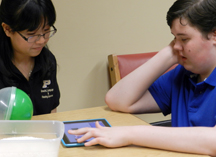Purdue innovation to help children, families affected by severe, non-verbal autism is adopted by leading clinical institutions in Florida, California
April 16, 2014
 |
|
A child affected by severe, non-verbal autism uses the SPEAK all! app to communicate with a student in Purdue's speech, language and hearing sciences department. (Purdue Research Foundation photo) |
WEST LAFAYETTE, Ind. - SPEAKall!!, an iPad application developed at Purdue University that facilitates communication and language development for children and families affected by severe, non-verbal autism, has been adopted for use at speech and language clinics at San Jose State University in California and the University of Central Florida in Orlando.
The app helps children communicate by using photos and graphic symbols that represent what a child wishes to say and helps the child construct sentences. The app works by speaking the word or sentence, which allows a child to communicate a thought and encourages natural speech and language production.
"The SpeakAll! app is a major technological advancement in the available Augmentative and Alternative Communication (AAC) tool kit for use with children with autism and other communication disorders," said Chad Nye, professor emeritus and executive director of the University of Central Florida Center for Autism and Related Disabilities. "The system is easy to understand, learn, adapt and deliver and should be in the professional tool kit of anyone working in the field of autism or other language interventions. The transparency of the actions make the stimulus and response items a practical application that can be individualized for each child. "
The app can be customized for the child's developmental level, and the pre-recorded speech within the program can use the parent's or primary caregiver's voice.
Jennifer Kent-Walsh, associate professor in the Department of Communication Sciences and Disorders and the director/regional coordinator of the FAAST ARDC at the University of Central Florida, said the university has implemented SPEAKall! into its program.
"We were immediately impressed by the clean layout of the SPEAKall! interface as we have been looking for ways to lesson sensory overload issues with dynamic displays for children with autism spectrum disorders (ASD)," Kent-Walsh said. "The evidence presented to date indicating efficacy for requesting is very reassuring, and we look forward to the possibility of further examination of efficacy for additional communicative functions. We are excited to have a new way to capitalize on the technology interest our clients with ASD often have through the use of this promising new app in the context of multi-modal communication."
SPEAKall! technology resulted from 20 years of clinical work and research by Oliver Wendt, a Purdue assistant professor of speech, language and hearing sciences and educational studies who works with children who have been diagnosed with severe, non-verbal autism.
"Communicating is one of the biggest challenges that children and families with autism face because often they do not have sufficient natural speech to meet their daily communication needs," said Wendt. "SPEAKall! provides an intuitive and sensory-friendly interface that reduces cognitive load, which lessens stress and anxiety for children and adults with severe, non-verbal autism or severe developmental speech and language delay."
The app was originally developed under Wendt's leadership by Purdue's Engineering Projects in Community Service, or EPICS, program in conjunction with the Purdue Augmentative and Alternative Communication Research Lab and the Purdue Speech-Language Clinic.
"Because speech is transitory, audio used in conjunction with a visual reference reinforces language and helps children learn to articulate sooner," said Wendy Quach, head of the San Jose State University Augmentative and Alternative Communication Program. "Our in-house clinic just opened, and we plan to incorporate the SPEAKall! technology in our program."
The app was launched in 2012 as an initial free version and was downloaded more than 20,000 times. It has been quickly adopted by the augmentative and alternative communication and autism communities, which resulted in a demand for support and advanced features.
A free version of SPEAKall! provides for the management of up to 20 graphic symbols, two activity sheets and one learner profile. Access to instructional materials, intervention videos and tech support is available at http://www.speakmod.com.
"We could not deliver advanced support through the basic SPEAKall! application, so we began a more in-depth level of research, development and commercialization work," Wendt said.
Premium versions of the app, available for purchase through speakmod.com, enable enhanced features and expandability including:
* Access to four different synthetic voices.
* Data tracking and management.
* Unlimited symbols, unlimited activity sheets and two learner profiles.
* Unlimited symbols, unlimited activity sheets and unlimited learner profiles.
Under development is a progressive version of the app called SPEAKmore!, which is designed for learners who have advanced beyond using simple sentence structures.
Wendt's research is sponsored by the Indiana Clinical and Translational Science Institute, a statewide project funded by the National Institutes of Health and involving Purdue, Indiana University and the University of Notre Dame, the Organization for Autism Research, and the Purdue University Center for Families.
SPEAKall! and SPEAKmore! are patented through the Purdue Office of Technology Commercialization. Wendt also receives entrepreneurial assistance through the Purdue Foundry, a startup support center based in Discovery Park's Burton D. Morgan Center for Entrepreneurship and the Entrepreneurial Leadership Academy.
Both products are being commercialized through SPEAKMODalities LLC, a startup co-founded by Wendt; Michael Zentner, a Purdue ITaP senior research scientist who assists faculty with research projects through the Purdue Foundry; and Diana Hancock, Purdue ITaP commercialization director.
Writer: Cynthia Sequin, 765-588-3340, casequin@prf.org
Sources: Oliver Wendt, 765-494-2462, olli@purdue.edu
Chad Nye, chadnye@gmail.com
Wendy Quach, wendy.quach@sjsu.edu
Jennifer Kent-Walsh, jkentwalsh@ucf.edu
Related website:
A video about the SPEAKall! app can be viewed at http://www.youtube.com/watch?v=QPy2NSYtj7U and information about SPEAK MODalities is available at http://www.speakmod.com

